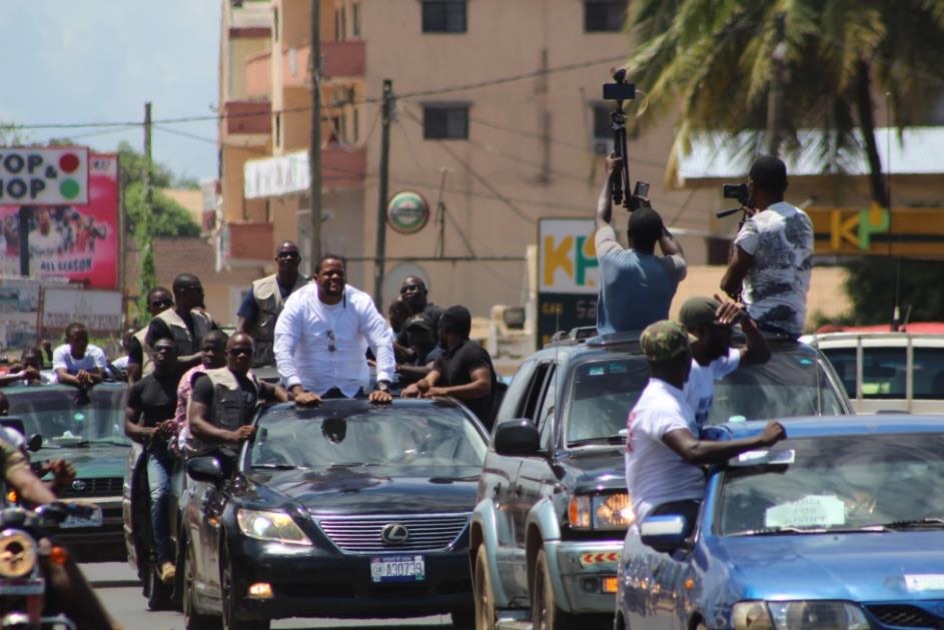On Unification Day, President George Weah summoned the organizers of the June 7 protest for a dialogue where he had hoped they would provide their demands to him, ostensibly, to ensure that the government could meet some of the demands in time to avoid the protest.
Even though organizers such as Darius Dillon have stated that the protest is a peaceful one that does not aim to unseat the president, government officials and sympathizers have been threatening or insinuating that the so-called Save the State protest risks destabilizing the country. Actions by international bodies have suggested that exercise of the constitutional right of citizens to protest is a dangerous action, as FrontPageAfrica reported that a U.N. envoy is expected in the country to assist in mediation between protesters and the president.
It is worth noting that a movement to push the government to serve its people and respect the rule of law is actually a stabilizing force in the medium term. Investors are likely to want to come to a country where they know the government will respect the rule of law and that there’s transparency in the government’s decisions. Such an environment means there will be an even playing field and predictability, which most investors usually like.
Regardless, the president’s attempt to extract the demands of the protesters aimed to get the government working toward meeting the demands. The strategy certainly makes sense, because if the protest date arrives and the government has already met the most pressing of the demands, Liberians will not feel like the state needs saving and they’ll be likely to stay home.
However, it is worth noting that Pres. Weah does not actually need to receive the demands from the protesters to start acting. He can get his government to start immediately addressing many of the issues revealed through past critical statements that have been made by the international community, civil society groups, and the opposition.
The president should know that people are not happy with his lack of commitment in the fight against corruption. After all, the Center for Transparency and Accountability in Liberia, the local affiliate of Transparency International, has been calling for the president to ensure the independence and vibrancy of anti-corruption organizations by giving them full moral, financial, and logistical support to enable them effectively to operate. Even the General Auditing Commission released a report evaluating how Liberia’s institutions that are designed to prevent corruption are performing, noting that the Liberia Anti-Corruption Commission largely failed in being effective in preventing corruption.
More recently, the anti-corruption advocacy group CENTAL called for the president to ensure that responsible individuals are held accountable for the missing L$16 billion case, a corruption scandal at the National Housing Authority, and the botched US$25 million mop-up exercise in a manner that does not appear like selective justice.
The president can engender public confidence in his fight against corruption by heeding those tidbits of advice while also ensuring that he and his officials declare their assets publicly. This will be very crucial given the reports of mass wealth accumulation by the president and his associates.
While the flawed Code of Conduct does not require declared assets of public officials to be made public, Pres. Weah can take a page from former president Ellen Johnson Sirleaf’s book and publicize his assets declaration. In a country where political patronage is prevalent, resulting in a lack of enforcement of anti-corruption laws, there’s little help in declaring assets if it’s sealed from the glare of the public and the media.
Besides the public’s concern over corruption, the Weah administration is aware of a similar unease about his government’s attempted and successful violations of the laws of the country.
Maryland’s Sen. Gblehbo Brown, Rep. Yekeh Kolubah of Montserrado’s 10th district, and the Alternative National Congress’ Alex Cummings all criticized the president’s illegal appointment and commissioning of George S. W. Patten as ambassador to the U.S. without approval from the Senate.
Moreover, the anti-corruption group Global Witness had also called the president out on his illegal appointment of Gabriel Nyenkan as head of the Liberia Extractive Industries Transparency Initiative when that decision was supposed to be made by the secretariat.
The Association of Liberian Human Resource Professionals has also criticized the president’s illegal decision to reduce the salaries of all civil servants making US$1,000 and above by 10 percent, noting that “the labor law does not allow an arbitrary deduction in the salary of any employee without the employee’s written consent.â€
The president needs to commit to abiding by the laws and, where possible, rescind his earlier illegal decisions to show good faith.
President Weah should also know that many are not happy with his dictatorial tendencies and the major influence he wields over the other two branches of government. His behind-the-scenes maneuvering to remove Associate Justice Kabineh Ja’neh did not ingratiate him with the opposition or legal groups such as the Liberia National Bar Association, whose president continues to speak out against what he calls the illegal removal of the Supreme Court justice.
In the legislature, independent and opposition lawmakers have complained that the heads of the two houses are subservient to the president and do not allow room for dissent or critical analysis of the president’s decisions.
The public perception is that the president controls all three branches of government. That is not good for democracy and certainly not good for a country like Liberia, whose political system and institutions are not mature enough. The president’s actions, if unchecked, could slowly move Liberia back into a dictatorship similar to what the country experienced under former president Charles Taylor. The international community, the opposition, and citizens, in general, are aware of this and want to prevent this from happening.
Finally, President Weah knows that the economy is not in good shape. Since he took over, the value of the Liberian currency has depreciated against the U.S. dollar by 45 percent – moving from 127 Liberian dollars to a U.S. dollar to now 185 Liberian dollars to a U.S. dollar. Liberia’s economy’s growth projection has been reduced by the IMF from 4.7 percent to now 0.4 percent – and it might get even worse. Despite fewer revenues coming in, Liberia’s wage bill has increased, making it difficult for the government to spend on high priority issues.
All this is coming as large employers like Firestone are cutting back on their workforce. This is all putting a strain on the average Liberian worker, especially when the government has not profferred believable ideas that can solve the economic situation.
If the president can put forth well-vetted ideas to get the Liberian economy moving and he can ensure that his administration starts acting on them, perhaps the public will have no longer see a reason to protest, as the president would now be on the right path.
What if the president worked with the legislature to propose cutting wasteful spending in the excessive salaries that they receive? Imagine the tens of millions of U.S. dollars that could be saved if Liberian lawmakers were not making more than their American counterparts. What if the president can put in place policies that can guard the Central Bank’s independence, so that it can focus on its core missions, without interference from the Executive Branch?
Actions like these can engender confidence in the president’s ability to lead the country through this tough time, and as a result, allay many citizens’ concerns that the state needs saving.
The president has already shown that he can take actions to improve some of these concerns. For example, the concern over the fiery rhetoric coming from his officials and the leaders of the ruling party led the president to not only suspend one of the key offenders, former deputy minister Eugene Fahngon, but the Executive Mansion also issued an order prohibiting officials from making incendiary remarks.
The majority of Liberians who might go out to protest on June 7 have nothing personal against the president or wish to see him removed from office. Rather, they are concerned about the decrease in Liberia’s international standing caused by a plethora of self-inflicted blunders from government officials. More importantly, protestors want to see signs that their government understands how to fix the current economic crisis. If President Weah can save the state before June 7, the protestors will not need to demand that he do so.
Featured photo by Zeze Ballah



